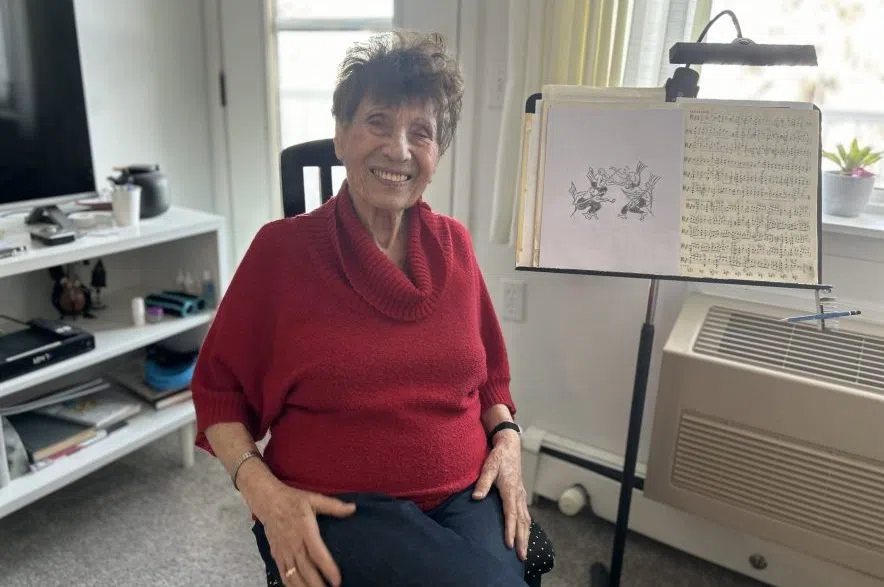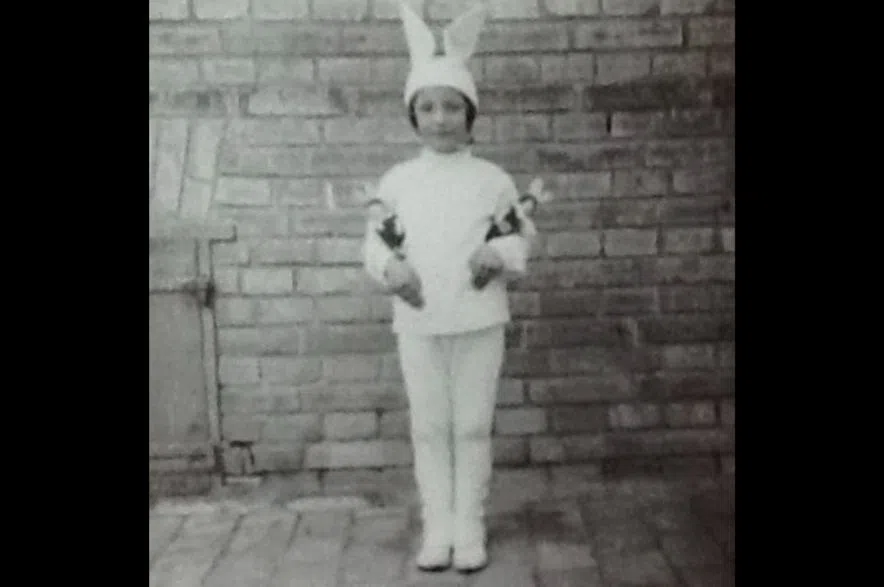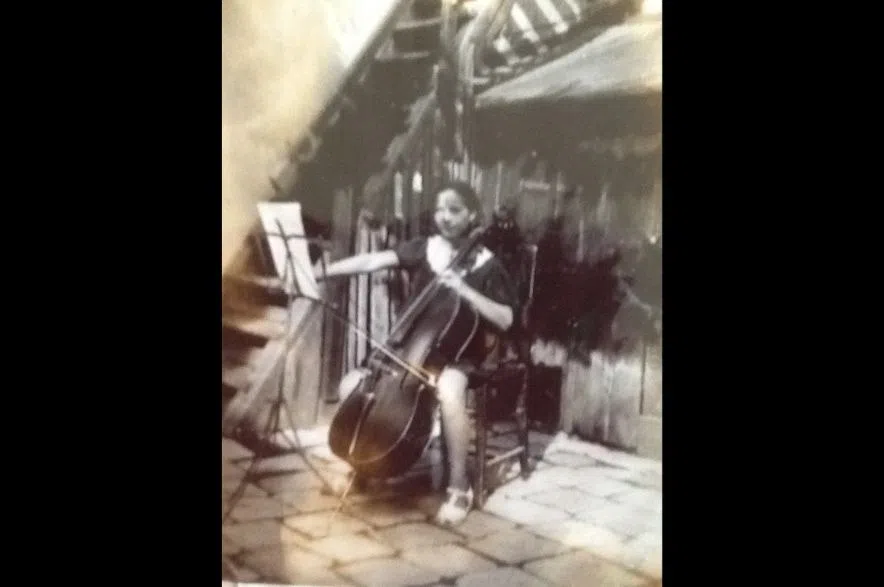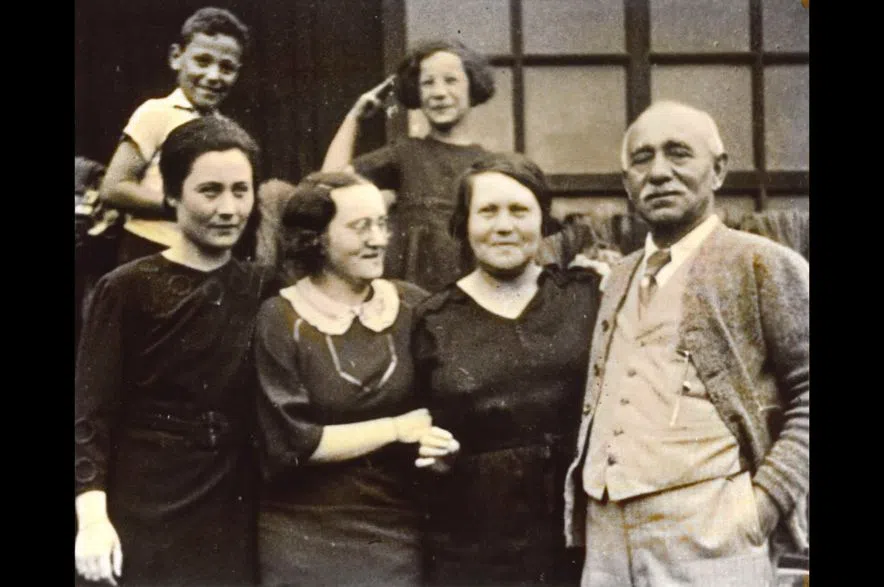Most of us are familiar with the story of Anne Frank: a young Jewish girl who, along with her family, hid from the Nazis in Amsterdam during World War II.
After two years of hiding, they were betrayed. Anne was eventually sent to the concentration camp of Bergen-Belsen in northern Germany.
While Anne Frank was in one section of the Nazi camp, Klara Belkin was in another.
Klara and Anne were alike in many ways. They were both 15 years old when they arrived in Bergen-Belsen, both were born into Jewish families and both had their lives upended by the horrors of the Holocaust.
Yet, there was one major difference: Anne Frank died in Bergen-Belsen in 1945, just weeks before the camp was liberated. Klara, on the other hand, survived.
Today, Klara Belkin lives in Saskatchewan. She sat down with 650 CKOM’s Brittany Caffet to share her remarkable journey in her own words.
In this exclusive three-part series, Belkin opens up about her harrowing experience in a notorious Nazi camp, her courageous escape and her eventual journey to Canada.
Listen to Episode 1:

Klara Belkin’s Saskatoon apartment, calm and quiet, contrasts sharply with the harrowing stories of survival, loss and resilience that have shaped her. Klara has lived through horrors that most of us can only imagine, yet here she sits, with a kind smile and a quiet dignity. (Brittany Caffet/650 CKOM)
Transcript of Episode 1:
95-year-old Klara Belkin is small in stature, but her presence fills the room. Her bright blue eyes are expressive and lively. She wears a Star of David pendant on a delicate chain around her neck, a quiet connection to her past.
Brittany: “Can you walk me through what life was like before you came to Canada?”
Klara: “You don’t want to hear that. It’s too much and too complicated. I don’t even know where to start and where to end.”
Born in Hungary, Klara led a childhood that now feels like another lifetime entirely.
CLIP: “We had a nice life. Just ordinary, really. There were some years of idyllic life, you know, when I was too young to know what’s going on.”

Klara Belkin was born in Hungary in 1929. The country sits near the middle of Europe, nestled between Austria and Romania. The landscape isn’t unlike Saskatchewan’s — flat plains, rolling hills, and serene rivers. Before the war, Klara led a childhood that she says now feels like another lifetime entirely. (Submitted)
Her early years were filled with music, laughter and the cello, an instrument that became a constant companion.
Klara: “Well, everybody was supposed to learn instruments in those days. So, they got me this cello, which was not my choice. My brother, because is a boy and cello is for man. My brother refused it completely. And they said, ‘if he doesn’t play the cello, then she has to play the cello.’ And I still can’t say no, so I had to do it.”
But a dark world was spreading across Europe.
Klara: “Going to the school, you know, walking to the school, kids were running after me, yelling bad words. That already started then. That’s what I remember before the war. It wasn’t pleasant, because I didn’t understand altogether why it happens to me and it’s not happening to other kids. I had to wear the yellow star, because that made me on the street for even people who didn’t even know I’m a Jew. When I went to school the kids were running after me yelling, ‘dirty Jew’. So, you can imagine. I guess that’s how I started to have a very low self esteem. Because I really thought something really is wrong with me, and wrong with us. With Jews. We’re not as good as them. Because I was a kid.”

Klara Belkin was six years old when she began learning the cello. Her music studies were interrupted in 1939 due to the many restrictions placed on Jews during World War II. She wouldn’t resume her studies until 1946. (Submitted)
By 1944, Hungary was occupied by Nazi forces.
Klara: “They made a ghetto around the synagogue. They put all the Jewish people into the ghetto. And if you don’t go, I mean, they either, I don’t know, shoot you or they take you there. We all went like cattle. There was high walls. You couldn’t go anywhere. Where would you go? We were locked up there. And so that was the end of my childhood really.”
Klara’s mother would whisper comforting words in the 14-year-old’s ear.
Klara: “My mom always said that we are going to live it through. I do not know if she believed it or not, but she kept our morale up.”
But within a matter of weeks, the family’s hope was shattered.

Until 1944, Klara Belkin’s family lived in an apartment in the city of Szeged in Hungary. The entire family was forced to move into a ghetto in Szeged before eventually being sent to the concentration camp Bergen-Belsen. (Submitted)
Klara: “The train station is quite far. So, the day came when we all had to go walk, it’s miles away. And the citizens were standing on the side of the street cheering. So, then we walked into the train station, and the train station had all these cattle cars waiting for us. So, they put us in, around 80 people into a cattle car. And those European cattle cars are not like the American cattle cars. Very small. We couldn’t sit down. We were just like sardine cans. They gave two pails, and we were for six days, locked up, not opened. That cattle car for over 80 people, and a cattle car with two pails. So, you can imagine what was going on in there.”
Klara pauses and takes a sip of water. It is clear speaking about her childhood is no easy task. After a few moments wistfully looking out the window, she exhales softly and begins again.
Free from the cattle car, she faced weeks of hard labour on a farm, bombs falling around them.
A number of weeks went before they were boarded onto yet another cattle car.
Klara: “They were very well organized. I guess. I don’t remember, you know exactly, but I guess they got us into another cattle car. Then they shipped us into the concentration camp.”
Hell awaited Klara.
But there were always signs of humanity.
Klara: “You know, people never lose their hope or their sense of humour. At night, the women were, there was one subject was talking about. They were cooking. All night, they were talking. Telling recipes. You know, I never forget. Every night you heard all kinds of beautiful recipes there. Yeah, that was something.”
Tomorrow you’ll learn about Klara’s resilience in the face of unspeakable horrors.
In Saskatoon, I’m Brittany Caffet.










